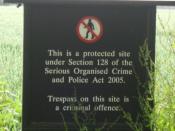The terms "Computer crime," "Computer-related crime," "High-tech crime" and "Cybercrime" are often used interchangeably. A difference can be made between computer specific crimes and traditional crimes performed with the aid of computer technology. Many countries have passed legislation to address computer-related crime. Under the Australian system of Government, all Australian States and Territories have a general power to enact criminal laws to operate within their own borders. The Commonwealth is limited to enacting criminal laws which fall within one of its enumerated heads of constitutional power; although within these heads of power it can enact law which is applicable across the country and extraterritorially. The Commonwealth's constitutional power to enact laws with respect to "telephonic, telegraphic and other like services" is of particular relevance in the context of cyberspace crime.
In many areas, including cyberspace crime, Commonwealth and State and Territory offences exist and operate side by side, with the State and Territory offences applying generally to wrongful conduct within that jurisdiction and the Commonwealth offences targeting particular aspects (for example, offences involving computers owned or leased by the Commonwealth, and offences involving a telecommunications carriage service).
Unlawful Access and Computer Trespass
(a) Hacking and cracking
"Hacker" and "cracker" are terms which are used to describe people who intentionally seek to access computer systems or networks with dishonest intentions. A cracker may access a system with destructive or malicious intentions, such as to alter data or to spread a virus, whereas a hacker is generally motivated by curiosity.
Hackers and crackers may be criminally liable if they access, or access and continue to examine, certain data. Cracking may also involve damage to data and fraud.
(b) Unauthorised access and computer trespass offences
Both the Commonwealth, and the States and Territories have enacted laws in relation to computer trespass...


